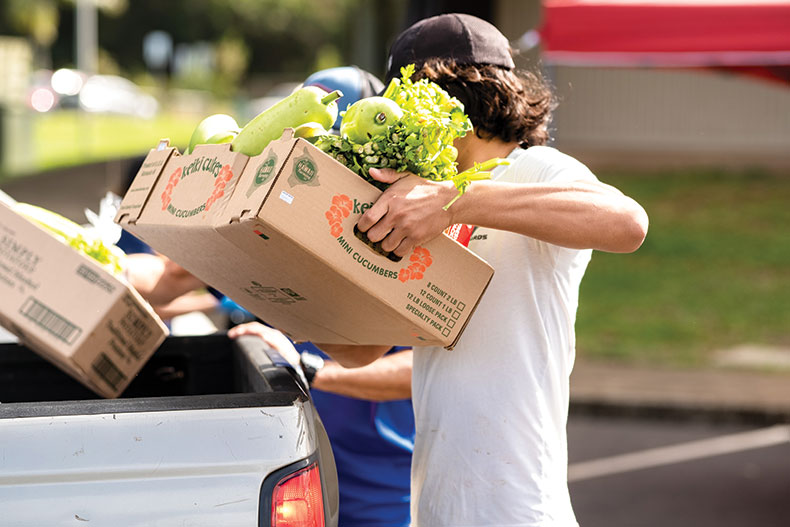Tackling Food Insecurity
The many innovative ways nonprofits are making healthy food more accessible.

Published: April 2024
Hunger is a persistent issue in Hawai’i that exists in every country. In total, there are 170,970 people facing hunger in the Islands, according to Feeding America, and 54,180 are children.
Kaiser Permanente is addressing food insecurity through a number of grants to nonprofits, who have found innovative and progressive ways to make healthy food more accessible to people.
“Food insecurity is so highly correlated with all these negative health outcomes, like heart disease, diabetes, and high blood pressure. We want to be the healthy option,” said Amy Miller, president and CEO of the Hawai‘i Foodbank.
The Hawai‘i Foodbank’s Farm to Food Bank program is a unique way to save and distribute food that would have otherwise been discarded. It pays for the costs associated with harvesting crops in cases where a farmer doesn’t feel it makes economic sense to take it to the retail market.
“We have a grant through the USDA for the Farm to Food Bank program and it requires a 100% match,” said Miller. “I think this is the third year in a row Kaiser Permanente has come in with a 100% match. It really helps to have a partner in the community like Kaiser Permanente that we can really count on.” Last year, through all of its programs, the Hawai‘i Foodbank distributed 19.5 million pounds of food. “No matter what your economic status is, everyone should have access to safe and healthy food,” said Miller.
Long-Term Support
One way Hawaii’s food banks are tackling food insecurity is by making sure no food is wasted. In 2017, the international nonprofit Natural Resources Defense Council found that 40% of all food in the U.S. never gets eaten and ends up in landfills.
At some farms, there are crops that never get harvested. When there are no buyers, it doesn’t make economic sense for farmers to collect the food they can’t sell, so they plow over the crops instead. To address this, Kaiser Permanente awarded grants to the Hawaii Foodbank and the Maui Food Bank to give them the means to purchase the fresh produce from those farms before they are lost.
The Maui Hub also works with local farmers through its online marketplace. The nonprofit organization gives farmers and ranchers a place to sell products directly to local people in hopes that it will help them increase food production.
“The other part of the mission is to make sure that the food produced and sold through Maui Hub is not just for the wealthy, that it’s accessible to all Maui residents, including our most vulnerable,” says Autumn Ness, president of Maui Hub.
Following the Maui fires, Maui Hub rolled out a Long-Term Fire Relief Nutrition Program supported from the start by Kaiser Permanente. It gives Lahaina families credits every month to use in the online store, where they can shop for locally grown fresh produce and local meats.
“That support lasts for a year so they have the confidence to know that they can be fed with good food and it’s, mentally, really amazing to know that your community has got you,” says Ness.
The nonprofit organization Feed the Hunger Fund provides loans to smaller, often overlooked small food entrepreneurs in the Islands. Last year, it loaned $2.5 million to Hawai‘i entrepreneurs. Feed the Hunger Fund was also able to offer grants to these small businesses, using funds provided by Kaiser Permanente.
“Our loans are really meant to go to low-income small businesses who are left out of the financial markets, and they don’t have access to the capital to either start businesses, or to grow their businesses, and they don’t necessarily have the technical assistance, or someone they can count on to run their business plans by,” says Patti Chang, CEO of Feed the Hunger Fund.
“That’s what I think is the secret sauce of our organization,” she adds. “We’re there for these businesses pre-loan, even before we make a loan, and post-loan, which can be up to five years.”
In response to the Maui fires, Feed the Hunger Fund created a new campaign called the Maui Build Back Stronger Small Business Grant Program, which sent support to 47 small businesses – and it will soon be helping more. “If the time comes for some of them to decide that they want to start again, or that they want to start in a different manner, they know that we’re there for them,” says Chang.
Targeting Kūpuna
The King Lunalilo Trust utilizes a community association to identify kūpuna who are food insecure on the West Side of O‘ahu, from Kapolei to Mākaha. Beneficiaries are not required to apply to receive help.
“We have worked with the Hawaiian Homestead Associations to identify kūpuna,” says Keolamaikalani Dean, CEO of the King Lunalilo Trust. “The requirements are simply that the community identifies that the kupuna needs hot meals.”
The local-style meals are at no cost and are delivered by volunteers. Since the program began in August 2023, it has delivered 11,000 meals for 265 kupuna.
“Kaiser Permanente awarded us $75,000 to provide hot meals delivered to kūpuna experiencing food insecurity,” says Dean. “Our kūpuna meal delivery program is only the first step in our plans to serve more kūpuna on the West Side of O‘ahu.”